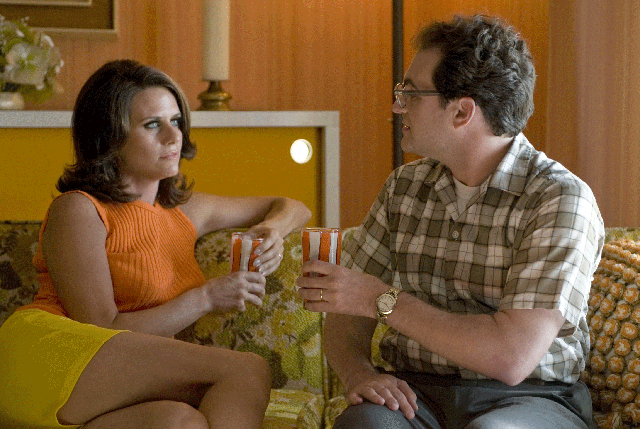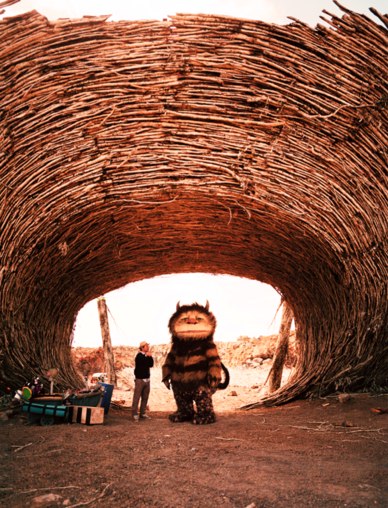
The Coen brothers new title A Serious Man enters theaters in 2009, set against the back drop of 1967 (or 1970 depending on the source). The film opens sometime in the 1800's with a ersaz parable about a dybbuk(demon). The woman, believing the man to be dead stabs him in the chest and he walks out of the house into the snow with the utensil still protruding from his chest. We then open to 1967, Larry Gopnik (Michael Stuhlbarg) is getting a physical at the doctors office, which is funny because he's a physics instructor at the local university on the eve of his tenure approval. He has a typical late '60's family, wife, one boy, one girl, suburban lifestyle. But at home his son in absorbed in the growing pop-culture of F Troop, Jefferson Airplane, and marijuana, where his daughter continues to attempt to shed her history in saving for a nose job. His wife has found another man she wants to marry and is seeking a religious divorce so she can remarry in the church. His unemployed brother, a math theorist of sorts, continues to drain his cyst in the bathroom all day and get arrested for counting cards in poker games at night. His neighbors form the poles of the political spectrum, on the right a Jew hating, boating, hunting, father and son combo, on the left a nude sunbathing, pot smoking, Jewish woman who "Takes advantage of the new freedoms."

As Larry is kicked out of his house by his wife and her would-be-husband Sy, The Columbia Record Club keeps calling his office phone, his son runs from Fagle a large boy trying to collect his $20 for pot, his daughter socializes at the local teen hangout, his wife employs an aggressive team of divorce attorneys, his brother has continuing problems with the law, and a North Korean exchange student and his father continue trying to bribe Larry to pass the failing Clive. Over the course of the film everything continues to be taken away from Larry, his money, his family (who don't seem to miss him much), his brother's happiness, his free time (now divided between lawyers and rabbis), and even his property as his neighbor marks off the area designated for his boat shed. And as each one of these hurdles gradually is overcome that sense of tension instead of being dispersed becomes even further complicated and more challenging.

It is in this fashion that the Coen brother tendency for parable become visual in Larry's connection to Job. Job, for those like me who know nothing of the 'good book', has all of the gilding of his life stripped away by god in the effort to make him speak out against the God. And so goes Larry's life culminated in the end by an impending tornado and an ominous phone call. Everything that was so good is taken away all at once. Larry, like Job, never goes as far as to speak out against "Hashem" (The Name). And it's at this point where dates become fairly significant for our understanding of the larger parable of the American experience.

In 1967 we are entrenched in the Vietnam War, the end of Modernism, the race riots and political processes that usher us into the Late Modern period of capitalism and what we now refer to as the postmodern period. In short the affluence saved up in the post-war post-depression eras is on the cusp of dramatic change just at the end point of this film. All of the multifaceted ways that the sheltered Jewish community of Minnesota is watching class tensions and political issues slowly efface their experience of American suburbia, are likewise happening again today in 2009. While the subtleties of these experiences and issues have changed they're still present in our national landscape. The suburbs are increasingly vacant after the economic wake of 2001 stock bubble crashing and the extended ripple culminating in 2008 as the tornado of Lehman Brothers, just as in the film. All the perceived prosperity of Larry Gopnik, founded on the Fordism of the previous generations, has become the hedge funds and future's trading of our post-Fordist Aughts. And thus as Grace Slick and the Rabbi Marshak ask: "When the truth is found to be lies, / And all the hope within you dies"? Leaving the part out about wanting someone to love is exactly right at this point. It's a statement about where we are, the quality of American globalization, the prominence of captialism on a global geography. Larry Gobnik is ever more right therefor to ask: "Why?" And so the Coens leave us with the most important question of all; one that requires further action.



